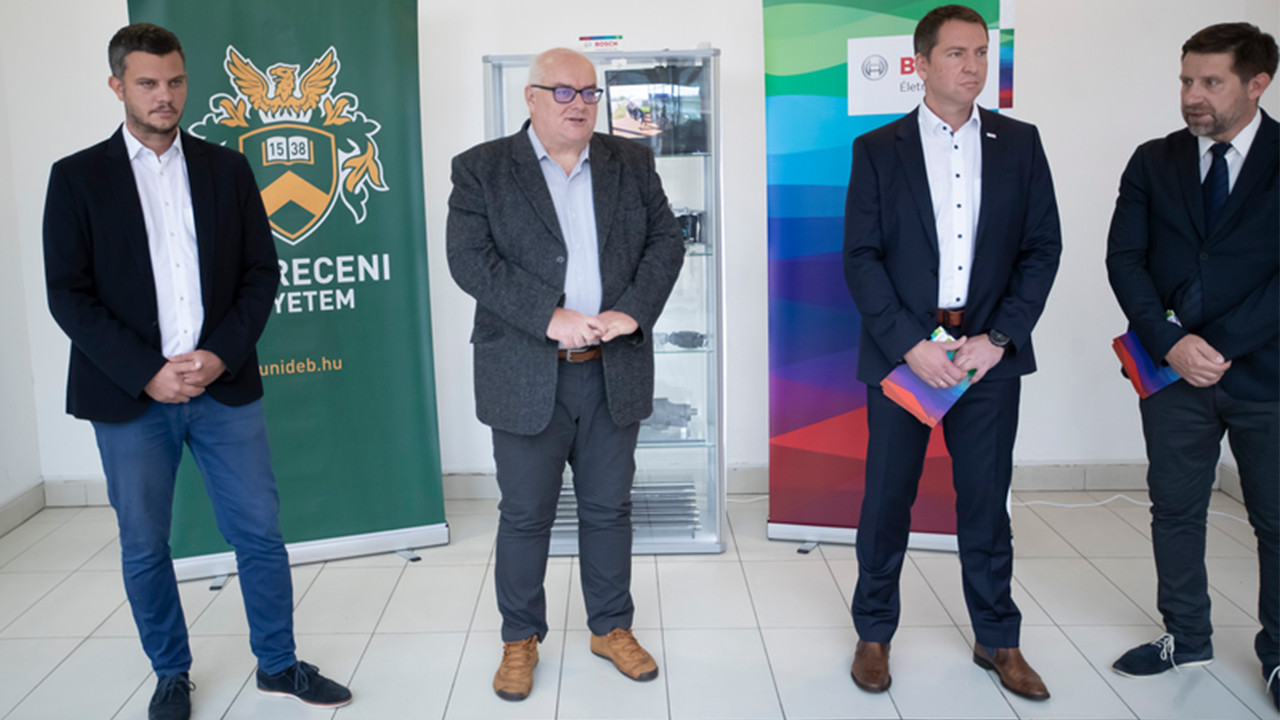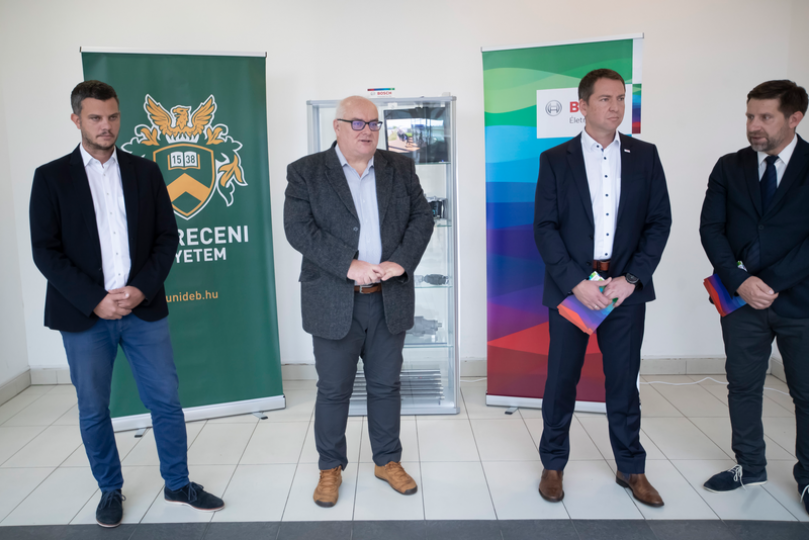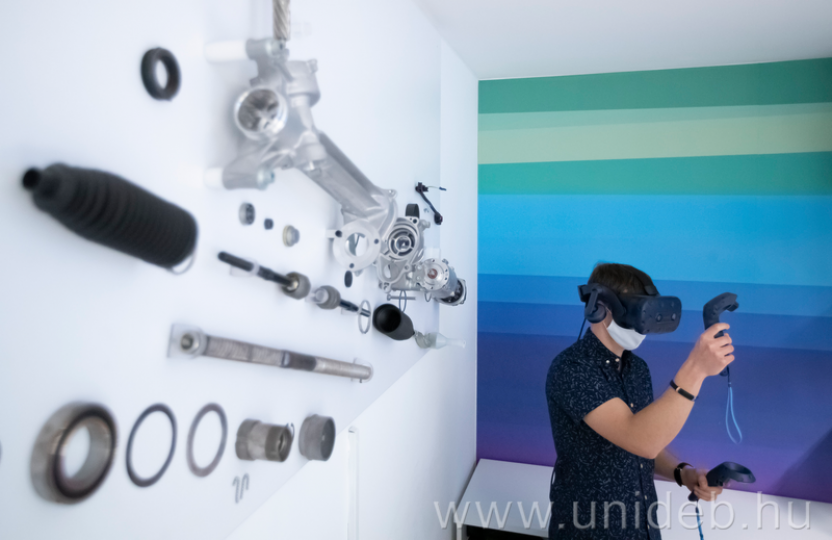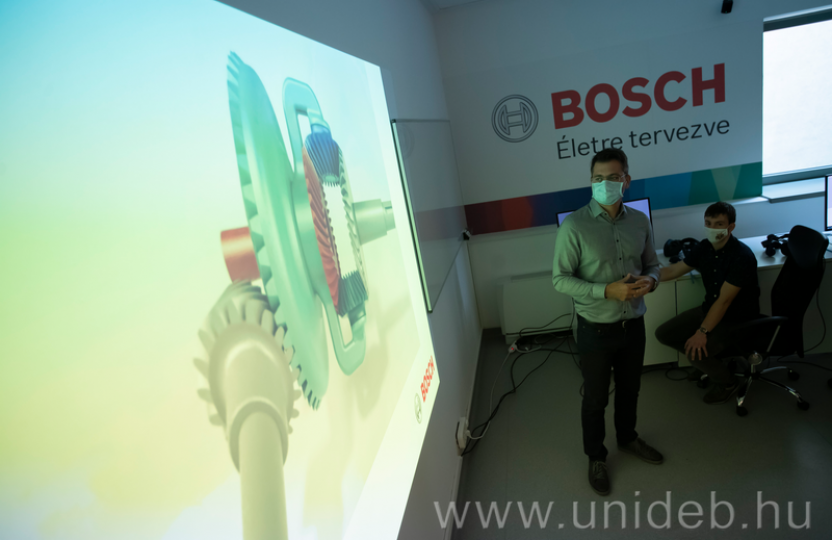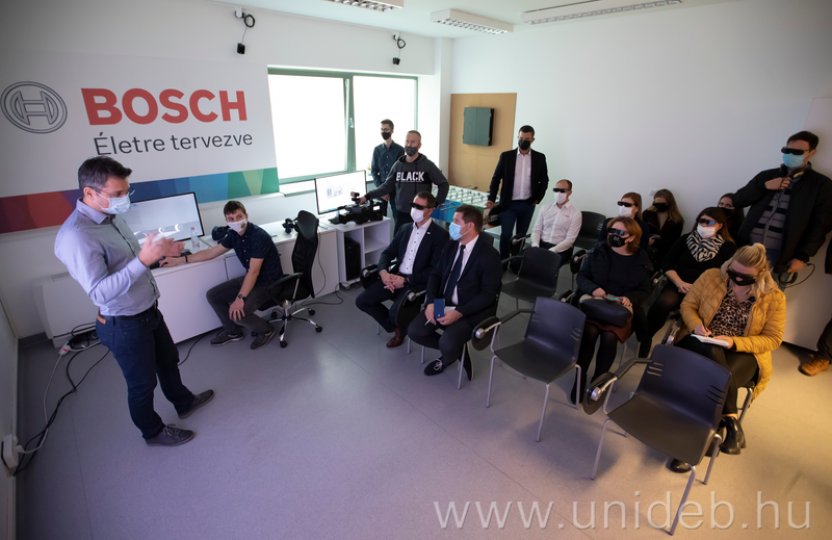Maklár – Virtual group work and lectures, 3D presentations, modeling with VR tools – will also be available in the future for engineering students studying at the Technical Faculty of the University of Debrecen in the laboratory of Bosch Maklár. The company has now equipped the Robert Bosch AS Engineering Training and Development Laboratory, which was established in 2017 by the Mechanical Engineering Department of the university, with VR tools to fill the gaps in engineering education. The state-of-the-art tools serve both educational and research purposes, enhance training and contribute to the launch of new projects. "One of the keys to Bosch's success is that we consider Hungarian universities as strategic partners and support the training of succession. It is important for us that students can acquire up-to-date and practical knowledge, which we can best contribute by improving education,” said Technical plant manager, Robert Bosch Automotive Steering Kft.
Educational development using state-of-the-art technology
"The advanced VR equipment are used to hold 3D presentations and lectures. Thanks to the excellent network, students and trainers can also collaborate in the virtual space with the help of the tools, "said Dr. Géza Husi, Dean of the Technical Faculty of the University of Debrecen.
“With VR tools, students can learn about modern technologies in practice, model production tools, and follow work processes with the help of the virtual world. In addition, the development of the laboratory provides an opportunity to research the engineering applications of VR devices,” said Dr. Tamás Mankovits, Head of the Department of Mechanical Engineering at the Technical Faculty of the University of Debrecen.
The laboratory will be used primarily by the mechanical engineering students of the Technical Faculty of the University of Debrecen. The new VR tools will support the understanding of more complex subjects such as mechanics, manufacturing technology, material science or machine elements more easily. Students can also get to know the modern methods of machine and product development.
Bosch also participates in dual training
Bosch's Maklár site has been supporting the mechanical engineering dual training of the University of Debrecen for years, so students can get to know the operation and expectations of a modern large company in practice. Students participating in dual training are free to use the laboratory to prepare design tasks, as well as to write their thesis or diploma work. The knowledge acquired here helps the settlement of newly graduated engineers, even at Bosch's Maklár site.
About Robert Bosch Automotive Steering Kft.
Robert Bosch Automotive Steering Kft. started operations 18 years ago with 35 employees, and today they employ 1,100 associates. Support for engineer succession has played an important role in its rapid expansion. The company supplies steering gears for passenger cars, steering columns and steering shafts for commercial vehicles, as well as refurbished parts to more than 100 vehicle manufacturers worldwide. The company has been manufacturing conventional hydraulic steering gears in Eger and electric steering gears and steering systems for trucks in Maklár since 2014. The production of the main components of electric steering gears started in 2015 at the Maklár plant. By now, more than three million steering systems and their components are released from the two sites each year, most of them being the most advanced, environmentally friendly electric steering system (EPS). In the future, the size of the Maklár site will continue to grow within the company group: Bosch will implement three investments worth more than HUF 52 billion in Maklár by the end of 2023. Investments will further increase the company's competitiveness, improve production capacity, introduce new technologies and create a global service center as well. Investments will contribute to both the retention of jobs and the creation of new ones.
Zita Hella Varga
Phone: +36 70 667-6374
Bosch has been present in Hungary since 1898 with its products. After its re-establishment as a regional trading company in 1991, Bosch has grown into one of Hungary’s largest foreign industrial employers with currently nine subsidiaries. In fiscal 2020 it had total net sales of 1,497 billion forints and consolidated sales to third parties on the Hungarian market of 238 billion forints. The Bosch Group in Hungary employs more than 15,500 associates (as of December 31, 2020). In addition to its manufacturing, commercial and development business, Bosch has a network of sales and service operations that covers the entire country.
The Bosch Group is a leading global supplier of technology and services. It employs roughly 395,000 associates worldwide (as of December 31, 2020). The company generated sales of 71.5 billion euros in 2020. Its operations are divided into four business sectors: Mobility Solutions, Industrial Technology, Consumer Goods, and Energy and Building Technology. As a leading IoT provider, Bosch offers innovative solutions for smart homes, Industry 4.0, and connected mobility. Bosch is pursuing a vision of mobility that is sustainable, safe, and exciting. It uses its expertise in sensor technology, software, and services, as well as its own IoT cloud, to offer its customers connected, cross-domain solutions from a single source. The Bosch Group’s strategic objective is to facilitate connected living with products and solutions that either contain artificial intelligence (AI) or have been developed or manufactured with its help. Bosch improves quality of life worldwide with products and services that are innovative and spark enthusiasm. In short, Bosch creates technology that is “Invented for life.” The Bosch Group comprises Robert Bosch GmbH and its roughly 440 subsidiary and regional companies in some 60 countries. Including sales and service partners, Bosch’s global manufacturing, engineering, and sales network covers nearly every country in the world. With its more than 400 locations worldwide, the Bosch Group has been carbon neutral since the first quarter of 2020. The basis for the company’s future growth is its innovative strength. At 129 locations across the globe, Bosch employs some 73,000 associates in research and development, of which nearly 34,000 are software engineers.
The company was set up in Stuttgart in 1886 by Robert Bosch (1861-1942) as “Workshop for Precision Mechanics and Electrical Engineering.” The special ownership structure of Robert Bosch GmbH guarantees the entrepreneurial freedom of the Bosch Group, making it possible for the company to plan over the long term and to undertake significant upfront investments in the safeguarding of its future. Ninety-four percent of the share capital of Robert Bosch GmbH is held by Robert Bosch Stiftung GmbH, a charitable foundation. The remaining shares are held by Robert Bosch GmbH and by a corporation owned by the Bosch family. The majority of voting rights are held by Robert Bosch Industrietreuhand KG, an industrial trust. The entrepreneurial ownership functions are carried out by the trust.
Additional information is available online at www.bosch.hu, iot.boschblog.hu, www.bosch.com, www.iot.bosch.com, www.bosch-press.com, http://www.twitter.com/BoschPress.

